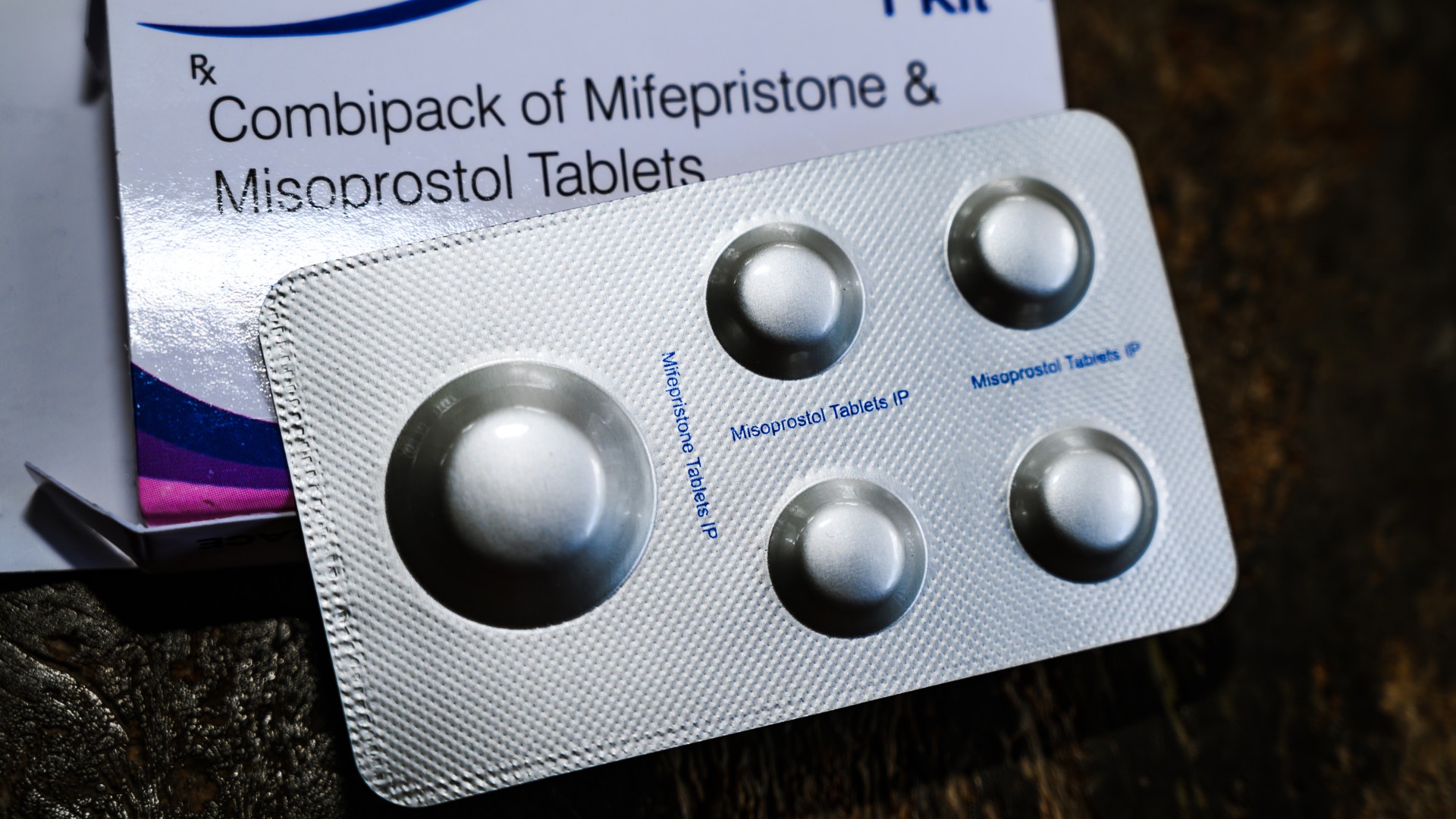Telehealth abortions are as safe and effective as in-person, large study shows
An analysis of more than 6,000 telehealth abortion recipients in the U.S. suggests that receiving the abortion drugs via a virtual doctor's appointment is as safe and effective as doing so in person.

Get the world’s most fascinating discoveries delivered straight to your inbox.
You are now subscribed
Your newsletter sign-up was successful
Want to add more newsletters?

Delivered Daily
Daily Newsletter
Sign up for the latest discoveries, groundbreaking research and fascinating breakthroughs that impact you and the wider world direct to your inbox.

Once a week
Life's Little Mysteries
Feed your curiosity with an exclusive mystery every week, solved with science and delivered direct to your inbox before it's seen anywhere else.

Once a week
How It Works
Sign up to our free science & technology newsletter for your weekly fix of fascinating articles, quick quizzes, amazing images, and more

Delivered daily
Space.com Newsletter
Breaking space news, the latest updates on rocket launches, skywatching events and more!

Once a month
Watch This Space
Sign up to our monthly entertainment newsletter to keep up with all our coverage of the latest sci-fi and space movies, tv shows, games and books.

Once a week
Night Sky This Week
Discover this week's must-see night sky events, moon phases, and stunning astrophotos. Sign up for our skywatching newsletter and explore the universe with us!
Join the club
Get full access to premium articles, exclusive features and a growing list of member rewards.
Using abortion pills that are prescribed via telehealth is just as safe and effective as having the medication prescribed in person, the largest study of its kind suggests.
The scientists behind the study say the finding could reassure patients who are skeptical about the safety and legitimacy of telehealth abortions and help meet the growing demand for accessible abortion since Roe v. Wade was overturned in 2022. Since that 2022 ruling, the safety of pills used in medication abortion — specifically, the drug mifepristone — has also been debated in state and federal appeals courts and will soon be addressed by the U.S. Supreme Court. The new study underscores this drug's already-proven safety record.
Medication abortions typically involve taking mifepristone and a second drug called misoprostol; this method can be used up to 10 weeks gestation, or 70 days from the start of a person's last menstrual period. The new analysis included more than 6,000 pregnant people who underwent telehealth abortions, 97.7% of whom successfully terminated their pregnancies without requiring any further treatment.
This rate is comparable to the 97.4% success rate described in Food and Drug Administration (FDA) drug label for mifepristone, as well as rates described in previous studies of medication abortion prescribed in person and then used either at home or in a hospital.
Related: Chemicals in plastics and cosmetics tied to preterm birth risk
Only 0.25% of the patients in the study experienced serious side effects related to their abortions, some of which required blood transfusions, for instance. Just 0.16% had an ectopic pregnancy, which is when the fertilized egg implants in tissue somewhere other than the uterus. This is a concern because, during a medication abortion at home, this rare complication might not be recognized as it could be in a clinic and could then rupture, requiring immediate treatment.
These figures are comparable to published data on medication abortions conducted after an in-person assessment: The rate of serious side effects ranges between 0.2% and 0.5%, and ectopic pregnancy rates are about 0.2%, the authors wrote in the new study, published Thursday (Feb. 15) in the journal Nature Medicine.
Get the world’s most fascinating discoveries delivered straight to your inbox.
"This is the largest study on telehealth abortion in the U.S. and significantly adds to the body of evidence showing its safety and effectiveness," Ushma Upadhyay, lead study author and a professor of obstetrics, gynecology and reproductive sciences at the University of California, San Francisco, told Live Science in an email.
The findings have "huge" policy implications, Upadhyay said. In 2021, the FDA ruled that mifepristone could be prescribed via remote consultations based on a patient's self-reported medical history rather than on in-person assessments involving an ultrasound, for instance. However, the Supreme Court is soon expected to determine whether this regulatory change should stay, after a federal appeals court ruled against it in 2023. The appeals court also argued that the drugs should be used only up to seven weeks of gestation and only in the presence of a physician.
"This research shows that the FDA followed science when it expanded how this medication could be dispensed," Upadhyay said. "The Supreme Court should follow suit and allow the FDA regulatory changes to stand," she said. There are some states that already ban telehealth abortions, but the Supreme Court's ruling would open the door for a nationwide ban.
In their analysis, Upadhyay and colleagues used data on 6,034 pregnant people in the California Home Abortion by Telehealth study. The patients received medication from three virtual clinics operating in 20 states and Washington, D.C., between April 2021 and January 2022.
Each patient received 200 milligrams of mifepristone followed by 1,600 or 800 micrograms of misoprostol, depending on whether they were more or less than 63 days pregnant. These drugs were prescribed after either a videoconference or secure text-message exchanges with a doctor and then delivered by mail.
—Abortion laws by state: https://reproductiverights.org/maps/abortion-laws-by-state/
—For questions about legal rights and self-managed abortion: www.reprolegalhelpline.org
—To find an abortion clinic in the U.S.: www.ineedanA.com
—Miscarriage & Abortion Hotline operated by doctors who can offer expert medical advice: Available online or at 833-246-2632
—To find practical support accessing abortion: www.apiarycollective.org
Anyone suspected of being more than 70 days pregnant or at risk of ectopic pregnancy were excluded and asked to go to a clinic for a pre-abortion ultrasound. The team followed up with each patient remotely three to seven days after their abortion and also about one to three weeks after that.
There was no difference in the effectiveness or safety of telehealth abortions between the patients who received care via video or text messages. The latter approach could make medication abortion more accessible to people without strong internet connections, the team wrote in the paper. Of course, that still leaves telehealth abortions inaccessible to those who don't own electronic devices or who are beyond the first trimester of pregnancy, the authors acknowledged.
The study didn't directly compare telehealth medication abortions to in-person abortions but rather looked at data available in published studies for the latter procedures. This could somewhat limit the generalizability of the findings.
Nevertheless, the study could help raise awareness of this increasingly common abortion method.
"I think there is more work to be done in making it more commonly known that an abortion can occur with medications and that a telehealth abortion is possible," Upadhyay said.
This article is for informational purposes only and is not meant to offer medical advice.

Emily is a health news writer based in London, United Kingdom. She holds a bachelor's degree in biology from Durham University and a master's degree in clinical and therapeutic neuroscience from Oxford University. She has worked in science communication, medical writing and as a local news reporter while undertaking NCTJ journalism training with News Associates. In 2018, she was named one of MHP Communications' 30 journalists to watch under 30.
 Live Science Plus
Live Science Plus











